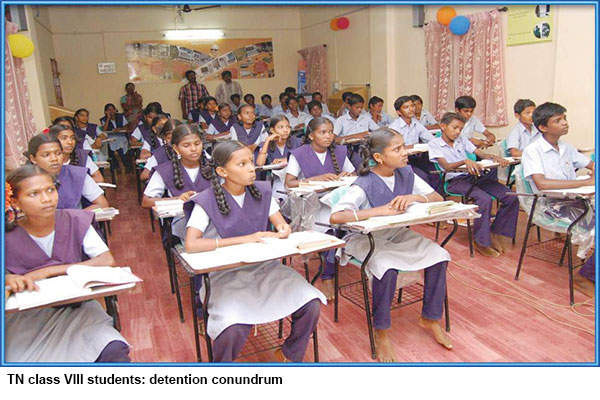 A September 13 order of the incumbent AIADMK government to introduce board exams for students in classes V and VIII (in addition to existing school-leaving board exams for classes X and XII) from the current academic year 2019-20, set the dovecotes of the state’s academy aflutter. But a strong volley of protests from educationists and political parties across the state has forced the state government to modify the order.
A September 13 order of the incumbent AIADMK government to introduce board exams for students in classes V and VIII (in addition to existing school-leaving board exams for classes X and XII) from the current academic year 2019-20, set the dovecotes of the state’s academy aflutter. But a strong volley of protests from educationists and political parties across the state has forced the state government to modify the order.
Now the official position is that although class V and VIII board exams are mandatory, students will not be detained for poor performance for the next three years to give them time to adapt to the new system. From 2022 onwards, students who fail these new board exams will be detained, but not expelled from school. Now class V and VIII board exams are mandatory for all 53,000 government and aided schools and 10,934 private matriculation schools affiliated with the Tamil Nadu State Board of School Education (TNSBSE). However, CISCE, CBSE and foreign boards-affiliated schools in TN are exempt.
The state government’s proposal comes in the wake of the amendment to the ‘no-detention’ provision of s.30 (1) of the Children’s Right to Free and Compulsory Education (RTE) Act, 2009. S.30 stipulates: “No child shall be required to pass any board exam until completion of elementary education.” On January 3, the Central government passed the RTE (Amendment) Act, 2019, which permits state governments to introduce board exams in elementary education and detain children in classes V and/or VIII if they fail in re-examinations to be conducted within two months of first failure.
The amended Act gives state governments the option to detain or not detain students in any class until the completion of elementary education. The Tamil Nadu government has chosen the first option.
According to school education secretary Pradeep Yadav, the state government’s order to conduct class V and class VIII board exams is aimed at assessing learning outcomes and providing remedial measures for the academically weak students in elementary education (class I-VIII) itself, rather than in secondary education.
The AIADMK government’s decision was prompted by persistent complaints of teachers and school administrators that learning outcomes were deteriorating due to the no-detention policy (NDP). Continuous promotion of academically weak students into high school (class IX) even if they lack basic skills and knowledge as testified by the Annual Status of Education Report (ASER) surveys published by Mumbai-based NGO Pratham, and the National Achievement Survey (NAS) of the Delhi-based National Council of Educational Research and Training, has had a cascading effect and weakened senior schools and even the state’s once vaunted colleges and universities.
However, informed educationists are shocked that instead of conducting routine school exams after reversing NDP, the state government has decreed conduct of board exams for classes V and VIII. “There’s no empirical evidence that the NDP has harmed children’s learning outcomes. On the contrary, s.30 (1) ensured that children from low-income urban households and rural areas didn’t drop out of school. The state government’s proposal to reintroduce board exams in elementary education will impose enormous stress and pressure on such children and increase dropout percentages,” prophesies R. Ramanujam, professor of computer science at the Institute of Mathematical Sciences, Chennai.
Nevertheless, the managements of private schools are in favour of board exams in elementary education. They believe early learning for board exams will mentally prepare students to face the pressures of class X and XII school-leaving boards. “School teachers will be committed to preparing children for board exams and students will become serious about studying for them. However, our main concern is about how the board exams will be conducted and on what students will be tested. Ideally, they should test primary, numeracy and cognitive skills of primary children and not heavy textbook content. Once students become proficient in basic skills, they won’t have problems with studies in higher classes,” says R. Visalakashi, president of the Tamil Nadu Private Schools Association.
With intense pressure to excel in classes X and XII board exams inevitable, given that only a few hundred of India’s 39,931 undergrad colleges and 993 universities offer globally benchmarked tertiary education — and the pressure for admission into them is intense — there’s considerable merit in acquainting children with competitive exams from early age. However, exam boards need to ensure they don’t force children to cram and regurgitate textbooks in their early years. This is the main cause of India’s school children performing disastrously in PISA and other international learning assessment tests. To repeat the assessment mistakes in senior and higher secondary education could take all the joy of learning out of school education.
Hemalatha Raghupathi (Chennai)


























